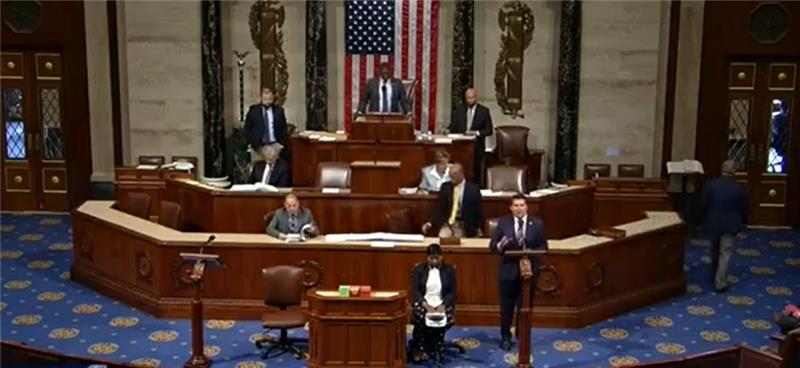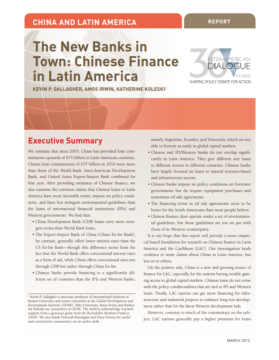Europe Might Take Another Step Back
If Spain fails to have the Common Position lifted or if it succeeds and Havana again turns down European economic cooperation, then Cuba wins once more.
A Daily Publication of The Dialogue
Legislators in the United States have been raising attention around political turmoil in Latin America, helping widen some of the U.S. Congress’ foreign policy focus to include more issues affecting the region, Axios reported this month. For example, Reps. Albio Sires (D-N.J.) and Joaquin Castro (D-Tex.) recently called on the Biden administration to monitor political violence during protests in Colombia, while U.S. Representative María Elvira Salazar (R-Fla.) introduced a bill to review Nicaragua’s free trade status amid a government crackdown against opponents. To what extent has there been a significant broadening of interests involving Latin America by the U.S. Congress, and what is driving this momentum? What role are U.S. legislators playing in positioning Latin America as a foreign policy priority, and which issues have taken center-stage? Is congressional pressure influencing the Biden administration’s strategy toward the region?
Mark Green, member of the U.S. House of Representatives (R-Ten.) and ranking member of the House Western Hemisphere, Civilian Security, Migration and International Economic Policy Subcommittee: “Supporting Latin America and the Caribbean’s efforts to recover from the pandemic and the economic downturn is a major bipartisan cause in Congress. There is a deep commitment for greater vaccine and health assistance to help the region overcome Covid-19. Simultaneously, many legislators see an opportunity to strengthen the region’s defenses against China’s predatory influence. Since China extended its Belt and Road Initiative into the region, lawmakers can see the deleterious effects that Communist China’s activities and investment have had. Job-creating manufacturing has decreased, and debt-trap diplomacy is on the rise. One thing is clear—Chinese Communist Party investment has undermined the region’s long-term development prospects. As ranking member of the Western Hemisphere Subcommittee, I have drafted legislation that will facilitate manufacturing companies moving from Communist China to Latin America and the Caribbean—if moving to the United States isn’t feasible for their business model. My Latin America Nearshoring Act will strengthen the United States’ ties with their region and contribute to the region’s economic recovery. Another major concern in LAC countries is the repressive regimes that created Latin America’s worst refugee crisis and foster poverty, crime and transnational criminal activity. In March, myself and Representatives Pfluger and Salazar called on the Biden administration to develop a strategy to address the humanitarian and security crisis in Venezuela and to hold the Cuban regime accountable for its human rights abuses. The United States should maintain a focus on holding the Maduro and Díaz-Canel regimes accountable.”
Donna Shalala, former member of the U.S. House of Representatives (D-Fla.): “If we care about improving global health, defending human rights and halting democratic backsliding, the United States has an obligation to make Latin America a foreign policy priority. The Biden administration is rightly emphasizing vaccine diplomacy—this will save lives. But this cannot be our only priority. The region is facing multiple crises, and members of Congress are also rightly taking their cues from constituents and those on the front lines in places such as Cuba, Venezuela and Nicaragua—those who are demanding accountable, democratic government. Congressional interest in Latin America is not a new phenomenon, but now more are paying attention. When I was in Congress, I actively worked to reform and improve the Trump administration’s misguided Venezuela policy, which strengthened the Maduro regime and failed to generate any real change for the Venezuelan people, by increasing funding for democracy programs and restricting the regime’s access to U.S.-made weapons. My predecessor made remarkable achievements in advancing human rights in the region, such as the bipartisan NICA Act, which helps to protect peaceful protesters in Nicaragua. Perhaps most salient right now is the bravery of thousands of Cubans who, in the face of food, medicine and power shortages, are standing up to the evil, authoritarian regime which has for far too long silenced dissent and maintained an iron fist over the Cuban people. I am heartened that so many in Congress—across the political spectrum—are speaking out.”
Jim Kolbe, senior transatlantic fellow at the German Marshall Fund of the United States and former member of the U.S. House of Representatives (R-Ariz.): “Immigration. It’s all about immigration. The U.S. public, Congress and both the current and previous administrations have been fixated on the issue of migration from Central America and its attendant problems—unaccompanied minors, deportation, detention centers, asylum. Meanwhile, political developments such as the assassination of Haiti’s president, widespread anti-government demonstrations in Cuba, Mexico’s veering toward a statist economy, Brazil’s catastrophic Covid numbers, Nicaragua’s growing repression of political opposition, Venezuela’s endless economic downward spiral—all get scant coverage in the media and brief mention by the political class. But few policy changes are forthcoming. Both Congress and the administration are in a reactive mode—responding to crises as they occur without long-term planning or solutions. As long as migration surges continue on our southern border, that issue will dominate the policy arena. Republicans believe they have a potent political weapon for the midterm elections, one that they can use as a cudgel against opponents for being ‘soft’ on illegal immigration. The administration’s response—easing or tightening border controls—will be determined by whether migration flows spike next year and how salient the issue is with voters. Both CAFTA and the USMCA (and its predecessor, NAFTA) have succeeded in increasing trade flows with the United States, but they have not brought about the hoped-for political changes in these countries. The Biden administration will focus its ‘trade’ agenda on enforcement of the environmental and labor provisions of USMCA and laying the groundwork for trade-related provisions that might be included in a global climate change agreement. An agenda that seeks to increase economic flows will have to wait until the second half of the Biden term and then will concentrate on the European Union, the United Kingdom and re-entry into the abandoned Trans-Pacific Partnership (TPP). The Western Hemisphere will have to wait.”
Peter Hakim, president emeritus of the Inter-American Dialogue: “Washington’s restrained and uncertain responses to the dramatic events in Haiti and Cuba in recent weeks was a stark reminder of the United States’ limited attention to Latin America. Despite the tragic and deepening humanitarian and political crises in the two nations, neither was on the radar screen of U.S. policy. President Biden has put aside his campaign promise to reverse Trump’s punishing policies toward Cuba and restore the Obama-initiated opening to Havana; his administration has largely ignored Haiti’s collapsed economy, crumbling political order and the mushrooming power of its criminal gangs. Understandably, the Biden administration is mainly focused on domestic challenges—confronting the pandemic, reviving the nation’s damaged democracy, tackling climate change and dealing with stubborn problems of race, gender and ethnic discrimination. Moreover, the White House’s foreign policy priorities are far from Latin America. Aside from efforts to restrain migration from Mexico and Central America, Washington’s interest in Latin America has steadily declined for years. Following the 9/11 attacks, U.S. attention turned sharply toward Asia and the Middle East, where U.S. security was threatened and business opportunities were burgeoning. At the same time, Latin America was also going global, and like the United States, has become economically intertwined with China, now South America’s largest trading partner. Biden has not yet done much to reverse the growing distance between United States and Latin America. While fighting Covid-19 tooth and nail at home, Biden has provided minimal assistance to the region’s battles with the virus, has done little to restore the credibility of weakened inter-American institutions and has not yet shown much U.S. leadership on issues of democracy or economic cooperation in the region. Congressional voices have had little impact on White House policy in Latin America, that is except for the few powerful senators who have kept intact Trump-era sanctions on Cuba.”
Rebecca Bill Chavez, nonresident senior fellow with the Peter D. Bell Rule of Law program at the Inter-American Dialogue and former U.S. deputy assistant secretary of defense for Western Hemisphere affairs: “We should welcome Congress’ attention to Latin America, a region that is far too often overlooked when it comes to broader U.S. foreign policy. I’m looking forward to the release of the Biden administration’s Western Hemisphere Strategy, which I anticipate will reflect the concerns about democratic governance highlighted by Representatives Sires, Castro, Salazar and others. Latino members of Congress in particular are recognizing and highlighting the direct connection between economic and social prosperity at home in the United States and the stability and advancement of our neighbors throughout the hemisphere, and their leadership will be critical to the development and success of the administration’s hemispheric strategy.The political violence in Colombia should serve as a reminder that an effective regional strategy must not be limited to the Northern Triangle, and Ortega’s crackdown on political opponents reminds us that a Central America Strategy must go beyond Guatemala, Honduras and El Salvador, to include Nicaragua. The Latin Americanists that serve in the Biden administration understand the shortcomings of a strategy that focuses solely on migration and illegal drugs. In addition to democracy and the rule of law, I expect that the administration will prioritize the challenges posed by poverty and inequality, climate change, citizen insecurity and corruption. Among the policy areas that should be in serious consideration are infrastructure development, encouragement of near-shoring, skills development and education throughout the region, public health improvement and institution building.”
 The Latin America Advisor features Q&A from leaders in politics, economics, and finance every business day. It is available to members of the Dialogue’s Corporate Program and others by subscription.
The Latin America Advisor features Q&A from leaders in politics, economics, and finance every business day. It is available to members of the Dialogue’s Corporate Program and others by subscription.
If Spain fails to have the Common Position lifted or if it succeeds and Havana again turns down European economic cooperation, then Cuba wins once more.
Hugo Chavez, the Venezuelan president, has clearly been enticed by the Libyan drama, where his longtime friend and ally, Muammar al-Qaddafi, is under siege from rebel forces.
Estimates of the volume, composition, and characteristics of Chinese lending to the region since 2005.
 The U.S. House of Representatives // File Photo: C-SPAN.
The U.S. House of Representatives // File Photo: C-SPAN.
